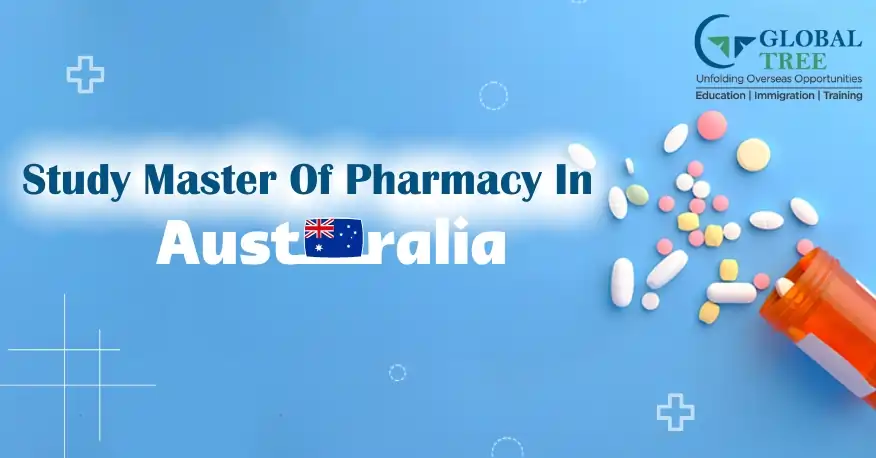Study Master of Pharmacy in Australia: Become a Highly Skilled & In-Demand Professional

- Introduction
- The Basics About Master of Pharmacy
- This Years Admission Process for Master of Pharmacy Programme:
- Syllabus you can expect in a Master of Pharmacy Degree
- List of Top Universities in Australia for Obtaining a Masters Degree in Pharmacy
- Latest Master in Pharmacy in Australia Fees
- This Years Scholarships available to international students for their masters degree in pharmacy in Australia
- Average Salary for a masters degree in pharmacy
- The Future Scope of a Masters Degree in Pharmacy and What to Do After the Course
- List of Jobs Opportunities for Masters Degree in Pharmacy
- The Master of Pharmacy Degree in Comparison to Other Related Courses
- Conclusion
- Master of Pharmacy Frequently Asked Questions
Introduction
The captivating world of pharmaceuticals beckons international students with the promise of innovation, patient care, and transformative healthcare solutions. Australia, renowned for its exceptional education and vibrant healthcare sector, offers a unique opportunity for aspiring pharmacists to pursue a Master of Pharmacy degree. This comprehensive guide aims to illuminate the path for international students, providing invaluable insights into the program's essence, admission process, premier universities, tuition fees, scholarships, projected career prospects, and frequently asked questions. Embark on a transformative journey as we navigate the realm of pharmacy in the heart of the Land Down Under.
The Basics About Master of Pharmacy
-
What exactly does Master n Pharmacy concern?
Students who successfully complete the requirements of a Master of Pharmacy programme to Study in Australia, will emerge with an in-depth understanding of pharmaceutical science, drug discovery, clinical pharmacy, patient care, and the administration of pharmacy practises. The curriculum places an emphasis on the science that lies behind pharmaceuticals, as well as their appropriate application and the influence that they have on patient health.
-
Who Should Study Master in Pharmacy?
Graduates with a degree in pharmacy or in an area connected to it who are interested in advancing their pharmaceutical knowledge, clinical abilities, and competence in patient care are ideal candidates for the programme. People who are interested in pursuing a career in hospital pharmacy, community pharmacy, pharmaceutical research, or regulatory affairs would benefit tremendously from this option.
-
Why Should You Choose to Major in Pharmacy in Australia?
An education in pharmaceuticals may be obtained in Australia that is on par with the best in the world thanks to the country's cutting-edge facilities, strong ties to the local business community, and a persistent focus on both research and clinical application. When they study pharmacy in Australia, overseas students have the opportunity to contribute to cutting-edge pharmaceutical breakthroughs, gain significant clinical experience, and be exposed to a healthcare system that is culturally and geographically diverse.
-
Highlights of a Master of Pharmacy Programme:
Time commitment: around two to two and a half years (give or take, depending on the institution and the layout of the courses).
Required Subjects: Include Medicinal Chemistry, Pharmacy Practise Management, Clinical Pharmacy, and Pharmaceutical Science.
This Years Admission Process for Master of Pharmacy Programme:
Prerequisites for Eligibility: Eligible Applicants in Australia for a Master of Pharmacy programme are normally required to hold a Bachelor of Pharmacy degree or a Bachelor's degree in an area closely linked to pharmacy from a reputable educational institution. Students from other countries are expected to be able to demonstrate a certain level of English language competency, which can be demonstrated by examinations such as the IELTS or the TOEFL.
Pharmacy Board of Australia: International students who want to become registered chemists in Australia are required to be aware of the standards established by the Pharmacy Board of Australia. These requirements include having a certain level of language proficiency, passing knowledge assessment exams, and participating in an internship programme.
Syllabus you can expect in a Master of Pharmacy Degree
The course outline for a Master of Pharmacy programme could be different from institution to university and from specialty to specialty. On the other hand, the following subject topics are typically included in the curriculum:
- An understanding of the development, formulation, and analysis of pharmaceutical products is required for the field of pharmaceutical science.
- The study of the effects of medications on the human body, the mechanisms of action, and the therapeutic applications of these findings is known as pharmacology.
- Learning about patient care, drug interactions, pharmaceutical treatment management, and evidence-based practise are all part of the clinical pharmacy curriculum.
- Pharmacy Practise Management is defined as the study of the business aspects of pharmacy, as well as ethics, laws, and healthcare delivery systems.
- Medicinal Chemistry refers to the study of the chemical composition and characteristics of various medications.
What is the application process for Australia?
List of Top Universities in Australia for Obtaining a Masters Degree in Pharmacy
There are a number of notable colleges in Australia that offer Master of Pharmacy programmes. These universities are well-known for the excellent quality of education they provide as well as the research contributions they make to the pharmaceutical field. The following is a list of some of the best universities in the world where students from other countries can earn their Master of Pharmacy degree:
- University of Sydney: A rigorous Master of Pharmacy programme that places a significant emphasis on clinical pharmacy practise, patient care, and research is one of the many options available to students at the University of Sydney. Students will be prepared for a wide variety of pharmacy careers in a variety of healthcare settings by participating in this programme.
- The University of Monash: The Master of Pharmacy programme at Monash University is highly regarded for its forward-thinking instructional strategies, state-of-the-art research, and rigorous clinical training. It ensures that graduates are well-prepared for the profession of pharmacy by providing a combination of theoretical knowledge and practical experience throughout the programme.
- The University of Queensland ( UQ): Students who are interested in pursuing jobs in the pharmaceutical sector are the primary target audience for UQ's Master of Pharmaceutical sector Practise programme. This programme provides insights into the business side of pharmacy by covering regulatory affairs, pharmaceutical production, and medication discovery.
- Curtin University: The Master of Pharmacy programme at Curtin University places an emphasis on training graduates who have good clinical skills and who are able to provide patient-centered treatment. Students are provided with an all-encompassing grasp of pharmacy practise as a result of the curriculum's integration of theory, practise, and research.
- The University of Western Australia (UWA): The Master of Pharmacy programme at the University of Washington in Seattle has an emphasis on clinical pharmacy, patient care, and research. Students leave the programme with the knowledge and abilities necessary to flourish in a wide variety of pharmacy-related roles and responsibilities.
Check out the Complete list of Top Universities to Study in Australia!
Latest Master in Pharmacy in Australia Fees
The cost of tuition for Master of Pharmacy programmes in Australia varies from university to university, depending on how long the programme is and whether or not the student is an Australian resident or an overseas student. The annual tuition costs for international students might range anywhere from AUD 30,000 to AUD 50,000 on average. In addition, while students are preparing their budget, they should take into account the cost of living, the cost of textbooks, and any other costs.
This Years Scholarships available to international students for their masters degree in pharmacy in Australia
Scholarships and other forms of financial assistance are made available by a good number of universities in Australia to international students who are enrolled in Master of Pharmacy programmes. The following are examples of well-known scholarships:
- Scholarships bestowed by the Australia Awards: These scholarships are offered by the government of Australia to provide financial assistance to students from developing nations who are pursuing higher education in Australia.
- Scholarship for Endeavour Graduate Students: This fellowship is made possible by the Australian government and offers financial assistance to students from other countries who are pursuing a master's degree in one of a number of disciplines, including pharmacy.
- Scholarships Awarded Only to Specific Universities: There are a number of universities that provide overseas students who are qualified in the field of pharmacy with merit-based scholarships, research fellowships, and assistantships.
Complete details of Most Popular Scholarships in Australia
Average Salary for a masters degree in pharmacy
There are a number of elements that might influence a chemist's salary in Australia, including their level of experience, location, the sort of pharmacy practise they engage in, and their area of specialty. In Australia, a certified chemist can expect to make anything from AU$60,000 to AU$90,000 per year on their salary, on average. Higher incomes, ranging from $90,000 to $120,000 or more, are possible for chemists who have significant amounts of experience, specialised skills, and advanced roles in their organisations.
The Future Scope of a Masters Degree in Pharmacy and What to Do After the Course
After obtaining a Master of Pharmacy in Australia, international students have the opportunity to investigate a wide variety of career options and avenues within the field of pharmacy, including the following:
- Community Pharmacist: an individual who works in community pharmacies and provides patients with medication counselling, fills prescriptions, and provides patients with general healthcare advice.
- Assuring the safe and effective use of drugs: in hospital settings, collaborating with healthcare teams, and coordinating medication therapy are the primary responsibilities of a hospital pharmacist.
- The role of the clinical pharmacist: include working in collaboration with other healthcare professionals, carrying out drug reviews, and ensuring that medication therapy is being optimised in clinical settings.
- Pursuing responsibilities: in pharmaceutical research, drug development, regulatory affairs, quality control, or pharmaceutical sales while working in the pharmaceutical industry is considered to be a professional in the pharmaceutical industry.
- The role of the Pharmacy Manager: is to oversee the day-to-day operations of a pharmacy, manage its workforce, and ensure that the business complies with all applicable rules.
Why Australia? Learn about its educational Structure
List of Jobs Opportunities for Masters Degree in Pharmacy
After finishing a Master of Pharmacy degree in Australia, international students have the opportunity to explore a variety of career paths within the area of pharmacy, including the following:
- Working at retail pharmacies, giving patients with medication counselling, filling prescriptions, and providing general healthcare guidance to clients are the primary responsibilities of community pharmacists.
- Hospital chemists are responsible for ensuring that medications used in hospital settings are used safely and effectively, coordinating with other members of healthcare teams, and managing pharmaceutical therapy.
- Optimising drug therapy, carrying out medication evaluations, and making suggestions in clinical settings that are supported by evidence are the responsibilities of a clinical chemist.
- Professional Working in the Pharmaceutical Industry: working within the pharmaceutical industry in positions relating to research, medication development, regulatory affairs, quality control, or pharmaceutical sales.
- Pharmacy Manager: Responsible for overseeing the operations of a pharmacy, managing staff, ensuring regulatory compliance, and maintaining efficient pharmacy practises.
- Pharmacy Supervisor: Responsible for overseeing the operations of a pharmacy.
The Most popular Jobs and internships you can find in Australia
The Master of Pharmacy Degree in Comparison to Other Related Courses
A Master of Pharmacy is designed primarily for individuals who are interested in acquiring specialised knowledge and abilities in the field of pharmacy; nevertheless, there are associated degrees that offer skills that are complimentary to those obtained in the fields of healthcare and pharmaceutical sciences. A comparison would look like this:
The difference between a Master of Pharmacy and a Master of Pharmaceutical Sciences is as follows: Pharmacy practise, patient care, and the application of pharmacological knowledge in various healthcare settings are the primary emphases of a Master of Pharmacy education. The scientific facets of drug discovery, formulation, and research are emphasised throughout the course of study for a Master of Pharmaceutical Sciences.
The difference between a Master of Pharmacy and a Doctor of Pharmacy (PharmD): A Master of Pharmacy is a postgraduate degree that allows students to further their education in the field of pharmacy. In some nations, including the United States of America, earning a professional degree known as a Doctor of Pharmacy, or PharmD, is necessary in order to work as a licenced pharmacist.
Comparison of a Master of Pharmacy degree to a Master of Public Health (MPH) degree: Pharmacy practise, patient care, and other drug-related topics are the primary foci of a Master of Pharmacy degree. A Master of Public Health (MPH) degree programme delves into more comprehensive aspects of public health, including epidemiology, health policy, and illness prevention.
The difference between a Master of Pharmacy and a Master of Clinical Pharmacy is as follows: A Master of Pharmacy degree will educate you on numerous facets of the pharmaceutical industry, such as clinical pharmacy, patient care, and the management of pharmacy practises. An advanced clinical pharmacy practise, the administration of drug therapy, and evidence-based care are the three primary objectives of a Master of Clinical Pharmacy education.
Conclusion
A Master of Pharmacy in Australia provides international students with an extraordinary opportunity to obtain advanced pharmacological knowledge, clinical skills, and a fulfilling career in the ever-changing landscape of the healthcare industry. Students can have a substantial impact on patient care and contribute to the advancement of pharmaceutical science if they attend prestigious educational institutions, cultivate relationships within the pharmaceutical business, and gain experience in a variety of pharmacy professions. Aspiring pharmacists can embark on a rewarding educational path that will prepare them for a fulfilling future in the essential profession of pharmacy by selecting the area of pharmacy they wish to specialise in, the university they wish to attend, and the scholarships for which they are eligible. Earning your Master of Pharmacy in Australia will allow you to participate in exceptional pharmaceutical education and provide you the opportunity to help shape the future of healthcare.
Contact: Global Tree for the latest information
and get a free counseling session today!
Master of Pharmacy Frequently Asked Questions
-
Can international students work in Australia after completing their Master of Pharmacy studies?
Yes, international students who complete their Master of Pharmacy studies in Australia may be eligible for post-study work opportunities in Australia. After completing their Master of Pharmacy studies, international students may be eligible for post-study work opportunities in Australia under the Temporary Graduate Visa (Subclass 485) This visa gives international students the opportunity to gain valuable work experience within the Australian healthcare system.
-
What are the prerequisites for the Master of Pharmacy programme? Do you need to do an internship or some other type of practical training?
Pharmacy placements, clinical rotations, and other forms of hands-on experience in a variety of healthcare settings are some of the practical training components that are included in many Master of Pharmacy programmes in Australia. These hands-on experiences are absolutely necessary for building clinical abilities and acquiring expertise in the actual practise of pharmacy in the real world.
-
Following the completion of their Master of Pharmacy degrees in Australia, what types of employment opportunities are available to international students?
Graduates of the Master of Pharmacy programme are qualified to pursue a wide variety of job prospects, including positions as community pharmacists, hospital pharmacists, clinical pharmacists, professionals in the pharmaceutical business, and pharmacy managers. There is a continuing increase in the number of fascinating job opportunities available in the healthcare sector in Australia due to the demand for qualified chemists.









